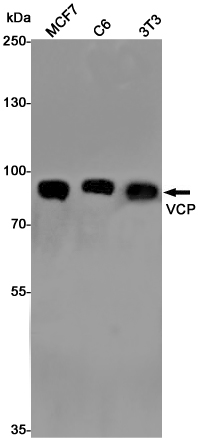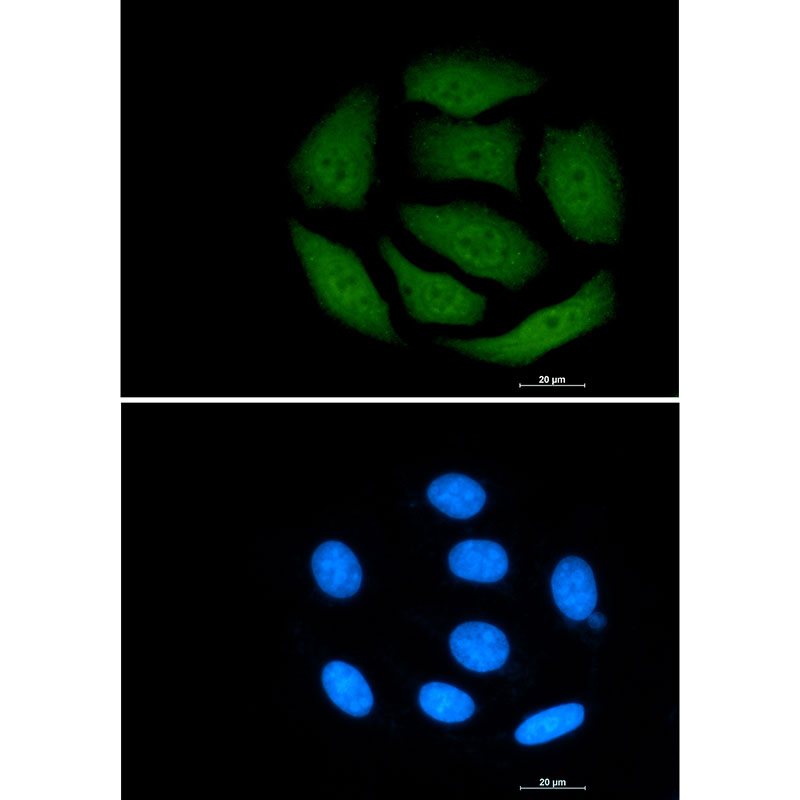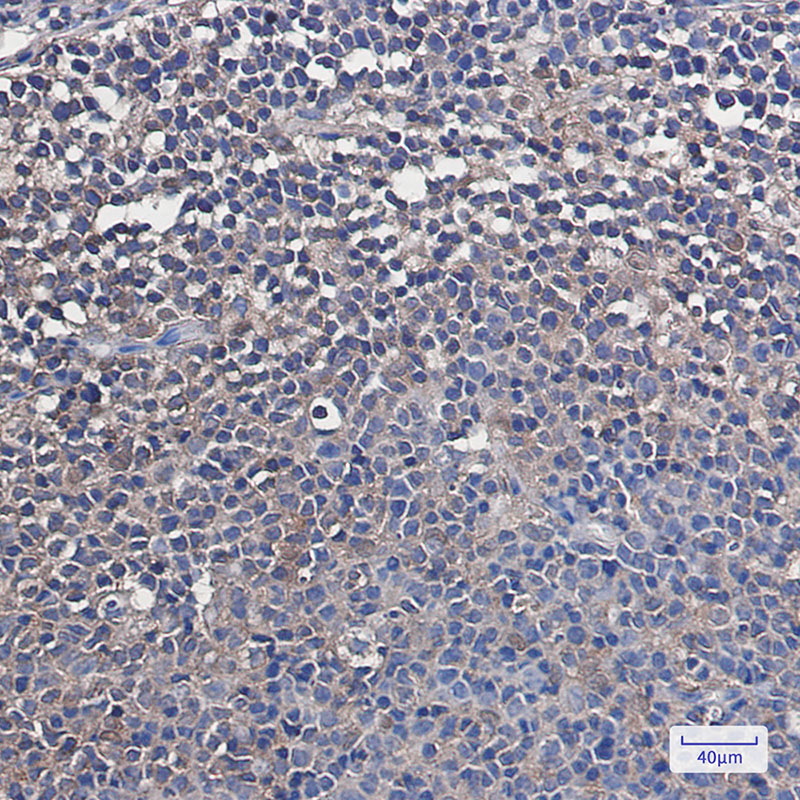


| WB | 1/500-1/1000 | Human,Mouse,Rat |
| IF | 1/20 | Human,Mouse,Rat |
| IHC | 1/50-1/100 | Human,Mouse,Rat |
| ICC | 1/50-1/200 | Human,Mouse,Rat |
| FCM | 咨询技术 | Human,Mouse,Rat |
| Elisa | 咨询技术 | Human,Mouse,Rat |
| Aliases | 15S Mg(2+) ATPase p97 subunit; ALS14; ATPase p97; CDC48; IBMPFD; p97; TER ATPase; TERA; VCP; Yeast Cdc48p homolog |
| Entrez GeneID | 7415 |
| WB Predicted band size | Calculated MW: 89 kDa; Observed MW: 89 kDa |
| Host/Isotype | Rabbit IgG |
| Antibody Type | Primary antibody |
| Storage | Store at 4°C short term. Aliquot and store at -20°C long term. Avoid freeze/thaw cycles. |
| Species Reactivity | Human,Mouse,Rat |
| Immunogen | A synthetic peptide of human VCP |
| Formulation | Purified antibody in TBS with 0.05% sodium azide,0.05%BSA and 50% glycerol. |
+ +
以下是关于VCP(Valosin-containing protein)抗体的3篇参考文献及其摘要概述,涵盖疾病机制、诊断及治疗应用方向:
---
1. **文献名称**:*Mutations in the VCP gene cause inclusion body myopathy with Paget disease and frontotemporal dementia*
**作者**:Watts GDJ, et al.
**摘要概述**:本研究首次发现VCP基因突变与包涵体肌病(IBM)、Paget骨病和额颞叶痴呆(IBMPFD)的关联。研究利用VCP抗体检测突变蛋白在患者肌肉组织中的异常聚集,揭示了VCP功能异常导致蛋白质降解通路受损的机制,为诊断提供了分子标志物。
---
2. **文献名称**:*VCP/p97 is essential for maturation of ubiquitin-containing autophagosomes and the ubiquitin-fusion degradation pathway*
**作者**:Tresse E, et al.
**摘要概述**:文章通过VCP抗体介导的免疫沉淀实验,阐明VCP/p97在自噬体和泛素-蛋白酶体系统中的关键作用。研究显示,VCP功能障碍会导致泛素化蛋白聚集,与神经退行性疾病(如ALS)的病理过程密切相关。
---
3. **文献名称**:*Targeting VCP enhances anticancer activity of proteasome inhibitors via integrated stress response modulation*
**作者**:Anderson DJ, et al.
**摘要概述**:该研究利用VCP抗体筛选癌症细胞系中的VCP表达水平,发现抑制VCP可增强蛋白酶体抑制剂的抗肿瘤效果。研究为基于VCP抗体的癌症靶向治疗策略提供了实验依据,尤其在多发性骨髓瘤中显示潜在疗效。
---
**备注**:上述文献均涉及VCP抗体在机制研究或临床诊断/治疗中的应用,如需具体引用格式或DOI号,建议通过PubMed或期刊数据库进一步查询。
**Background of VCP Antibodies**
Valosin-containing protein (VCP), also known as p97 or CDC48. is a highly conserved ATPase critical for ubiquitin-dependent protein degradation and cellular homeostasis. It plays a central role in endoplasmic reticulum-associated degradation (ERAD), autophagy, DNA repair, and cell cycle regulation. VCP dysfunction is linked to neurodegenerative disorders (e.g., ALS, Alzheimer’s) and myopathies (e.g., inclusion body myopathy), often due to mutations causing protein aggregation or impaired proteostasis.
VCP antibodies are essential tools for studying its expression, localization, and molecular interactions. They enable detection via techniques like Western blot, immunohistochemistry, and immunofluorescence, aiding research into disease mechanisms. Specific antibodies target distinct VCP domains or post-translational modifications, helping dissect its roles in cellular pathways.
Clinically, VCP antibodies assist in diagnosing VCP-related diseases. For instance, autoantibodies against VCP are occasionally detected in autoimmune conditions, though their pathogenic role remains unclear. Additionally, elevated VCP levels in cancers (e.g., hepatocellular carcinoma) correlate with tumor progression, making it a potential biomarker.
Research continues to explore VCP's therapeutic targeting. Inhibitors and gene therapies are under investigation, with antibodies serving as both diagnostic aids and functional probes. Understanding VCP's multifaceted roles through antibody-based studies remains pivotal for unraveling its contributions to disease and developing precision therapies.
×